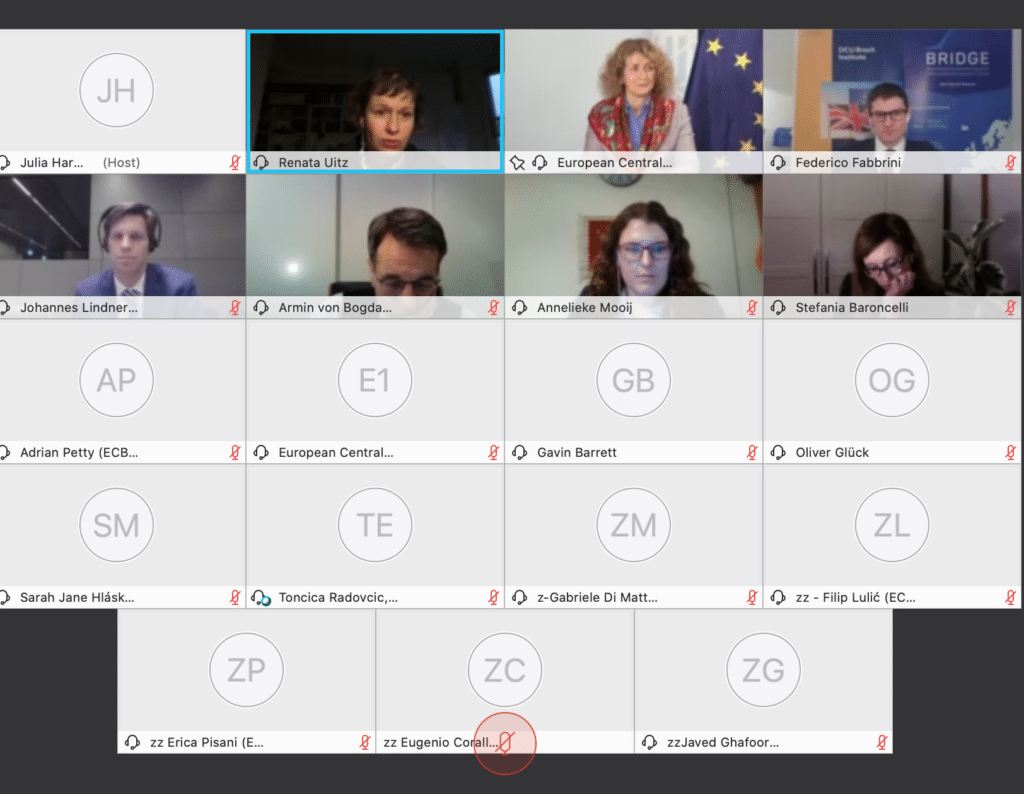On 15 December the partners of the Jean Monnet Network BRIDGE, led by the Brexit Institute, together with the Free University of Bozen-Bolzano, the University of Copenhagen and the Central European University organized at, and in collaboration with, the European Central Bank (ECB), an event on “Post-Pandemic Economic Governance”.
The event featured an introduction by Frank Elderson (Member of the ECB Executive Board), a keynote speech by Philip Lane (Member of the ECB Executive Board & ECB Chief Economist), followed by a panel, chaired by Dr Chiara Zilioli (Director General of ECB Legal Service), featuring presentations by Prof. Stefania Baroncelli (University of Bolzano/Bozen) & Annelieke Mooij (DCU), Prof. Federico Fabbrini (Brexit Institute) and Prof. Renata Uitz (CEU). Dr Johannes Lindner (ECB), ), Prof. Armin von Bogdandy (Max Planck Institute Heidelberg) and Dr Oliver Glück (Managing Partner, GSK Stockmann) discussed and broadened the research presented by BRIDGE Network researchers providing the viewpoint of the EU institutions, academia, and private practitioners.
The event was introduced by Frank Elderson, Member of the ECB’s Executive Board who presented his role as well as the academic speakers and the topic introduced. Philip Lane, ECB Executive Board Member & Chief Economist, undertook a presentation on the resilience of the Euro to the financial crisis, providing an update on the status of the EU economic governance. He also assessed the institutional architecture of the euro as well as its political economy, stressed by the Covid-19 emergency.
Then Federico Fabbrini took the floor and presented his research on the implications of the Covid 19 pandemic for economic and monetary union. In his presentation, entitled ‘Europe’s Economic and Monetary Union beyond Covid-19’ he underlined the path of reform of the EMU after Covid-19. Then followed a presentation on “Budgetary conditionality after the 2020 December deal” by Professor Renata Uitz who gave also details on the very recent compromise on the Multiannual Financial Framework. The last academic presentation was given by Annelieke Mooij and Stefania Baroncelli discussed their very recent joint paper on the judicial review of the ECB action (appeared also as BRIDGE network Working Paper) where they explained the ECJ case law on the ECB and its problematic approaches.
Then followed a very engaging discussion session based on the research presented led by Johannes Lindner, featuring also Prof. Armin von Bogdandy and Oliver Glück. Johannes Lindner, departing from Federico Fabbrini’s paper, explained the main challenges to the EMU before Covid, and in particular the Euro crisis and Brexit. He then followed on by examining how Covid-19 changed the landscape of the EMU. Then Armin Von Bogdandy took the floor exploring the relevance of the EMU in the EU constitutional legal space and drawing the way forward for the EMU while expressing skepticism on the opportunity of Treaty change. Oliver Glück (GSK Stockmann) concluded the second session with a presentation on “Development from an Economic Union to a Capital Markets Union” where he underlined challenges for financial services coming from the EMU.
The panel was followed by a lively discussion with the public, with questions coming from an audience of more than one hundred participants.


